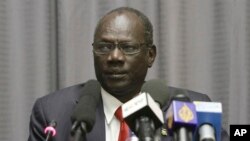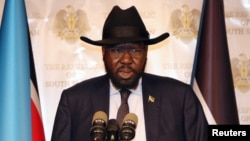South Sudan says the United States should rethink its decision to impose sanctions on two top government officials and a former army chief accused of obstructing peace in the country.
Washington imposed sanctions on Information Minister Michael Makuei, high-ranking military official Malek Reuben and former army chief General Paul Malong on Wednesday, saying they have taken actions that expanded South Sudan’s internal conflict and blocked efforts to establish peace.
Speaking to VOA’s South Sudan in Focus on Thursday, Maiwen Makol, Ministry of Foreign Affairs spokesperson, called the sanctions unfortunate.
“Sanctions will not bring help. What we think is the best option for the U.S. government is to support us do what we are doing, bring the peace in the country,” he said.
South Sudan has been mired in conflict between government and rebel forces since December 2013. The sides signed a peace accord in 2015, but the agreement fell apart a year later when army troops, reportedly operating under orders from Malong, attacked a rebel base in the capital, Juba.
Malong is under house arrest in Juba after a falling out with President Salva Kiir.
The U.S. accuses Reuben of profiting from the war and imposed sanctions on four companies he is believed to own or control. It says Makuei helped to organize attacks on U.N. peacekeepers and obstructed humanitarian aid from reaching people in need.
Contacted by VOA Thursday, Makuei said, “I don’t respond to claims in the social media, but we wait for the official communication by the American government to the government of Republic of South Sudan. It is thereafter that we will respond.”
The sanctions were announced Wednesday in statements from the U.S. Treasury and State Department.
Government critics applaud
In 2015, six South Sudanese men, including three opposition leaders, were sanctioned by the U.N. Security Council for their role in obstructing peace efforts in South Sudan.
James Okuk, a political lecturer at the University of Juba, says the latest sanctions are long overdue. He says South Sudanese leaders have proved they are not serious about ending the violence in South Sudan during the past three and a half years.
“There has been warnings several times that this is not acceptable, especially the war must stop and whoever is trying to obstruct the humanitarian delivery should stop. All these warnings ... went on deaf ears,” he told VOA.
Brian Adeba is associate director of policy at the Enough Project, which has closely tracked developments in Sudan and South Sudan for years. He says the sanctions send a clear message to those in power, even though President Kiir and rebel leader Riek Machar were not targeted.
“Usually you start at the bottom and hopefully the message reaches up to the top,” he said. “In international relations there is also this nonstated policy that you don’t really sanction the head of state, but you go after the people that are close to him, and that itself is a very clear message.”
Tainted image of country
Rajab Muhandis, executive director for the South Sudan Network for Democracy and Elections, says sanctions taint the image of the country. He urges the Trump administration to support the peace process in South Sudan.
“We would encourage that they should take lead in supporting the revitalization process of the peace agreement,” he said. “And increase diplomatic engagement with the parties to the conflict ... in order to agree on the best way forward.”
Continued fighting between government and opposition forces has displaced millions of citizens, forcing hundreds of thousands into refugee camps in neighboring countries.
The U.S. Treasury Department has threatened to sanction more South Sudanese officials if the fighting and obstruction of humanitarian assistance does not stop.
Sigal Mandelker, U.S. undersecretary for terrorism and financial intelligence, said Wednesday the U.S government will “forcefully respond to ongoing atrocities in South Sudan by targeting individuals who abuse human rights, seek to derail the peace process and obstruct reconciliation.”





